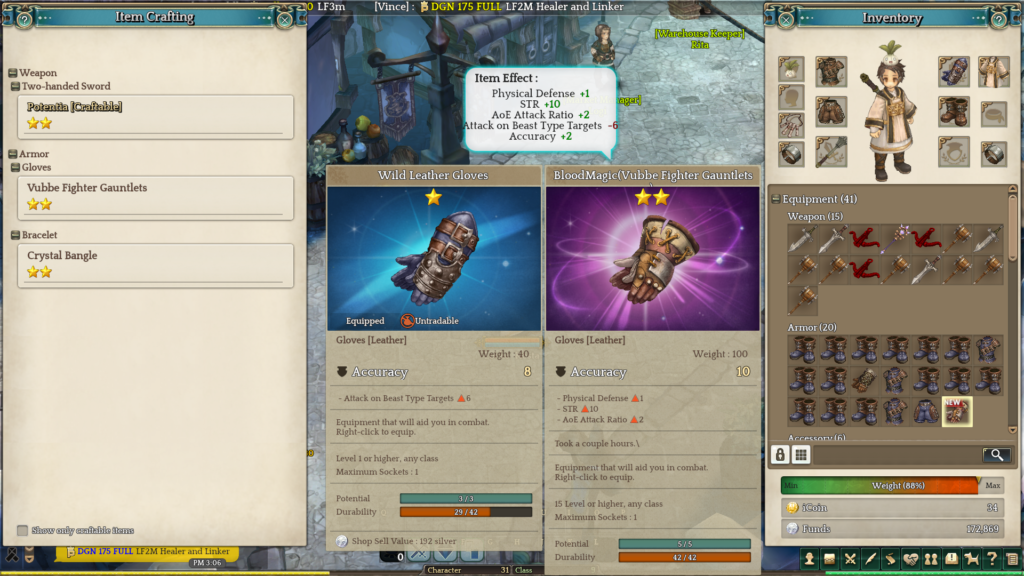One thing that’s not so much changed in the last ten years but has certainly been amplified is the popularity of games that, for lack of a better phrase, “feel like work.” Games that focus on things like:
- Getting loot
- Playing through the same content to get said loot
- Being at the mercy of some random number generator
- Aren’t really about skill, strategy, creative thinking, teamwork, etc. and but rather repetition and memorization
- Require the player to spend lots of time (on the order of hours or days) doing these repetitive tasks in order to get a reward of questionable utility (due to the RNG)

There used to be a time where this kind of style was almost exclusively the realm of Blizzard games like World of Warcraft. But with the rise of Live Service games, this approach to design is everywhere. Even a strictly single player game like Control couldn’t get away from having item farming, crafting, and procedurally generated quests (which is part of the reason I dropped it like a bad habit).
One thing I want to note – and I don’t have a solid argument for this claim – is that I don’t think stuff like Diablo 2 fits into this category. It’s largely the same in terms of its design, but I remember listening to people talk about their D2 experiences. They were almost always focused on the crazy moments that happened to them and their friends, rather than the loot they received (the loot was important, mind you, but the things that happened along the way still struck them as being noteworthy). In my head, in the “games as work” style, “watching numbers go up” is the only point to the experience. Everything else is just a rote mechanic that is a means to that end.
Now, I try really hard these days to fully understand and empathize with people before making judgements about them. But this is one subject where I find it hard to relate. I can live with Diablo 2-style click fests. Not my cup of tea, but whatever.
But the “games as work” style is something else. There’s something disturbing about them, or at least their prevalence. It suggests to me that there is some underlying explanation, beyond simply “people are different from you, and like different kinds of games.”
For example, is it possible that the rise of “games as work” as a trend is fueled in part by the fact that younger generations don’t have anything (or enough of the things) in life that gives them the feelings of accomplishment and productivity that even a simple retail job can sometimes offer? Do they look to video games for those feelings because the world has essentially failed them?

I’ll admit, a part of me wants this to be true. Not because I’m happy that the world is failing our youth, but because it would cast these players in a much more sympathetic light.
Also, if it turns out that this isn’t part of the answer, then it might mean I really am turning into a cranky old man who can’t understand others even if he tries. And that’s a fate I don’t want for myself.


There’s a certain joy to chores and chore like work, but (traditionally) often a certain additional burden of unpleasantness that goes with it. Stocking shelves all night and fretting about getting them done before the pesky customers mess up your awesome facing skills (ah, early employment) is satisfying in a lot of the same ways that these kinds of games are (as you noted). There’s a mellow joy to getting a box of things to look nice on a shelf, and gradually tearing through many boxes of things over and over again till they are all on a bunch of shelves (then doing it all again for the next pallet). You can even get in a kind of flow, similar to the ‘game experiences’ that fit the ‘games as work’ description.
I’d argue, though, that outside of the focused game experience (i.e. when doing repetitive work in real life), you also often have to deal with entirely unrelated irritating things that you can’t control. Your coworkers are different than you, and/or are unpleasant. You have to break your flow when washing dishes to focus on ignoring a spam call or text alert. Your parents aren’t satisfied with the job you did raking the yard, even if you were able to grasp the enjoyment of the experience itself. Why would a person who’s tasted a gaming experience DESIGNED to capture the specific humdrum pleasure of repetitive work (without interruption or complication) want to spend time doing something similar, organic, but ‘flawed’?
I could certainly be wrong, but I’d say ‘work games’ are providing a lowkey hit of the same serotonin a person can get from work in general, but without the mess. The issue, then, isn’t so much that this is the only source for this kind of enjoyment that a certain segment of the population can experience. To me, this appears to be another example of a carefully calculated type of product doing a somewhat troublingly great job of extracting cash from a vulnerable market segment and establishing a pattern of behavior that prioritizes the product over the health of the participant.
What a fabulous comment. Thank you.
Maybe that’s part of the problem. A menial job has those annoying external factors, but at the very least it results in money going to you (I say this while acknowledging that people doing that kind of work should be getting paid way more than they are). Whereas these games are designed take money from you. It’s almost like you’re paying for the “privilege” to work.
Also, I think you can argue that games can still have the equivalent of annoying coworkers and customers that ruin your shelves. They are things like other players, and RNG that might screw you over.
Fair, Christian, on both points! I tend to think it’s the presence of these imperfections that also provide value (i.e. growth as a person) beyond the very real benefits of getting money, and the simple pleasure that can come with the associated monotony. Cutting your teeth on navigating customer interactions, learning how to deal with interruptions to flow, or just coming to terms with not being to control the world around you are all potentially valuable experiences that are hard to sign up for if you don’t have to. So, not only are you paying someone else to work for them, you’re missing many of the actual soft skills you’d walk away with if you were being paid for your time.
I see what you mean about how these sorts of games have their own ways that a participant can experience annoyance, but I still wonder if the specific irritations of ‘interruption or complication’ are something devs in general work at honing out of a game. The kind of frustration that takes you out of the experience or has you deal with an unrelated problem before you can proceed (like telling a customer how to return expired cat food when all you really want to do is get all the annoying rimless bean cans stacked properly) seems like it’d fall into the kind of experience that would make most game players want to play a game less. I’m sure this kind of unpleasant feedback exists, but in the realm of a game, it’s something that’s either weeded out by a competent dev team refining their product, or becomes a reason why a ‘games service’ slowly falls out of favor.
I did do a little digging about other potential good reasons for folks to be playing games as work, and there are some interesting thoughts out there for potentially redeeming values for a subset of these games. If you haven’t already, check out this post (from a while back, now, but it still seems relevant) on Destructiod about ‘whittling’ vs ‘grinding’ in games. Basically, they are advocating for the joy we discussed as being a worthwhile activity in in of itself, as long as the underlying experience in the game is an enjoyable one, particularly if the point of the experience isn’t just a treadmill to an elusive ‘bigger and better’ macguffin that serves no real purpose (beyond staying on the treadmill).
[…] Gaming feels less and less about the acts of play, exploration, experimentation, etc. As I’ve said before, it feels more and more like work, or like a constant […]